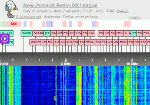RADIO NOTES (Part)
Prepared for the Guardian by STENTOR.
From the Ellesmere Guardian, Volume LV, Issue 64, 14 August 1934, Page 2.
Mr D. N. Adams, of Timaru, has been the successful competitor in the DX Cup competition, logging 546 verified stations. This competition originated some years ago, and each year the advance made in the number of stations logged has been amazing, indicating not only the worldwide growth of radio, but the great advances made in the construction of radio receivers. In 1931, 291 stations were logged, 366 the next-year, 416 in 1933, early this year 500, and now 546. Another remarkable feature of the competition is that on all four occasions the coveted trophy has been won by the aid of a Majestic receiver, a splendid tribute to the high standard of quality maintained by this well-known instrument.
The automatic radio has come. This latest set, which has been introduced by the makers of the Majestic, is a remarkable innovation in the radio field, and is another great stride forward in the constant improvement of radio entertainment in the home. The radio can be set for the entire day—by merely setting a series of buttons! Electricity does the rest. This set plays what is wanted—when it is wanted. Forty-eight programmes in a 12-hour period automatically afford definite 10-station setting and plays any four of these automatically; turns from one station to another automatically; plays any station 15 minutes or for any period multiple of 15 minutes automatically; stays silent for any period multiple of 15 minutes automatically; in short, it does everything wanted of a radio set and does it either automatically or manually.
As was anticipated, the powers that control our wavelengths have refused to make any alterations in the existing state of affairs in order that a few listeners may be able to hear a distant station in America (says a writer in an exchange). One cannot but feel that the authorities are correct. Local service must always take precedence over distant reception. The listener, after all, pays his license to receive primarily his own stations. If he paid his license only to find that not one of the local stations was audible owing to interference, he would have a legitimate complaint. There is very little about which to complain concerning reception of the New Zealand stations. That is more than the English listeners can say about their own stations. Indeed, in New Zealand, there is very little about which to complain as regards distant reception. Most of the Australian stations can be received without interference at almost any time they are audible.



